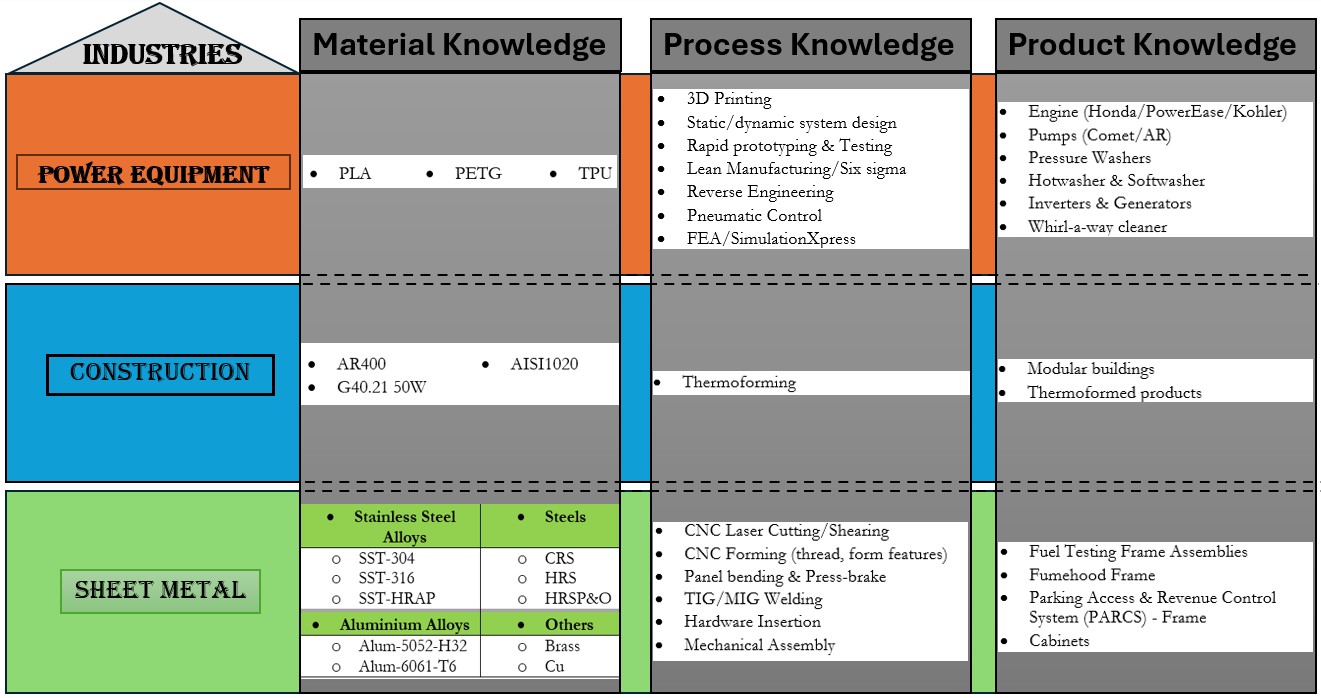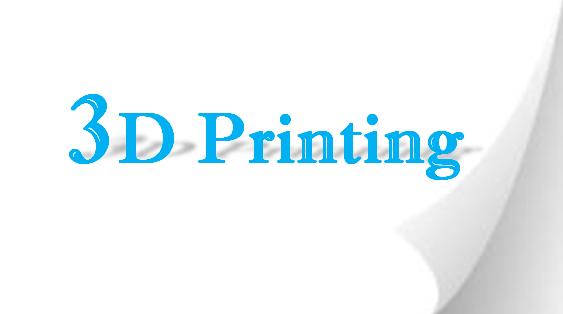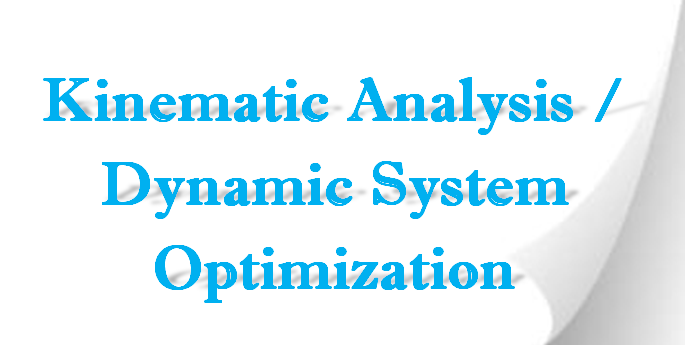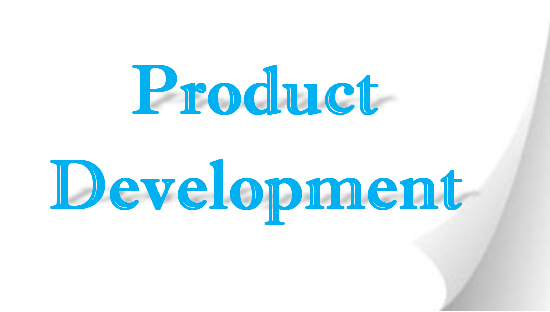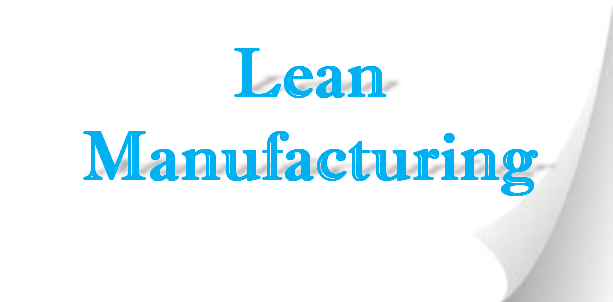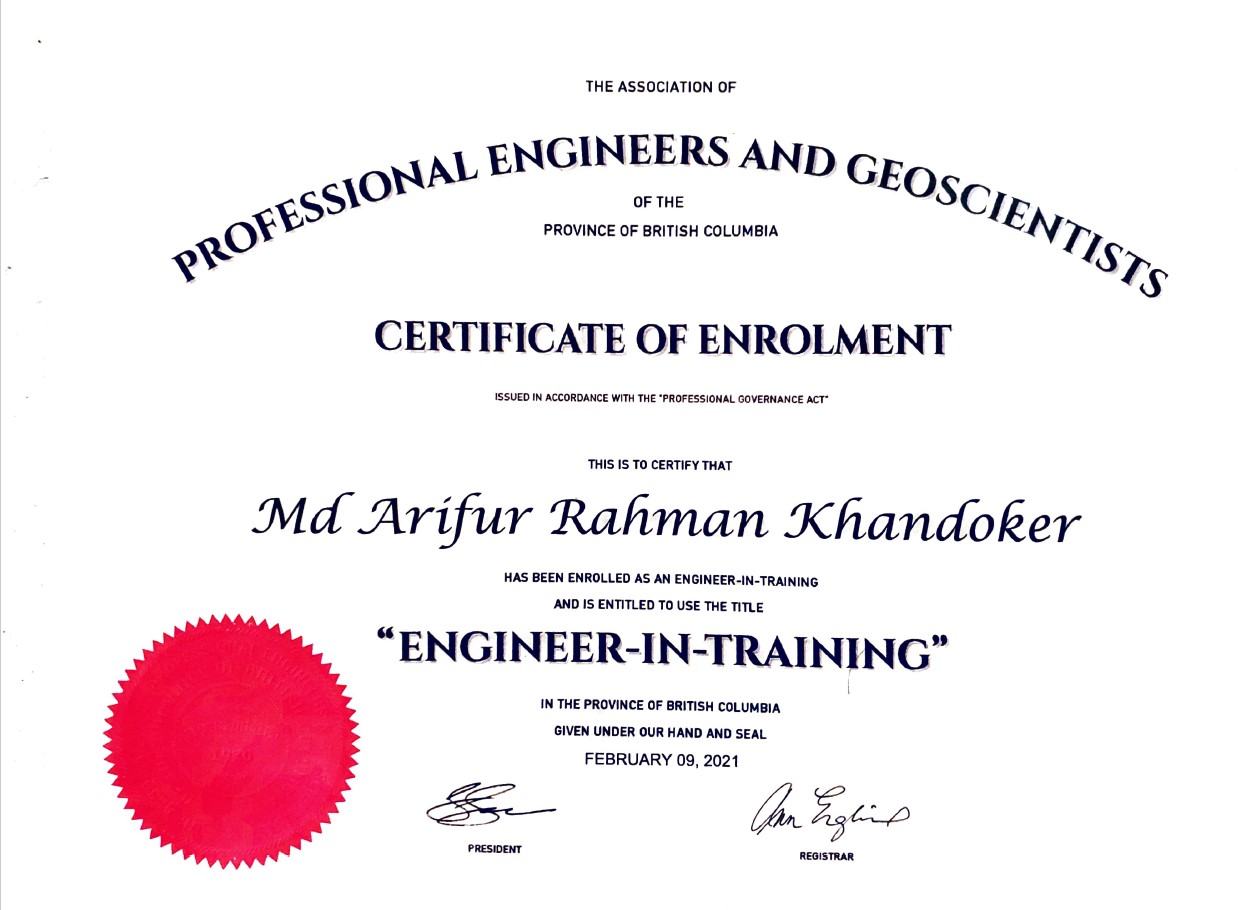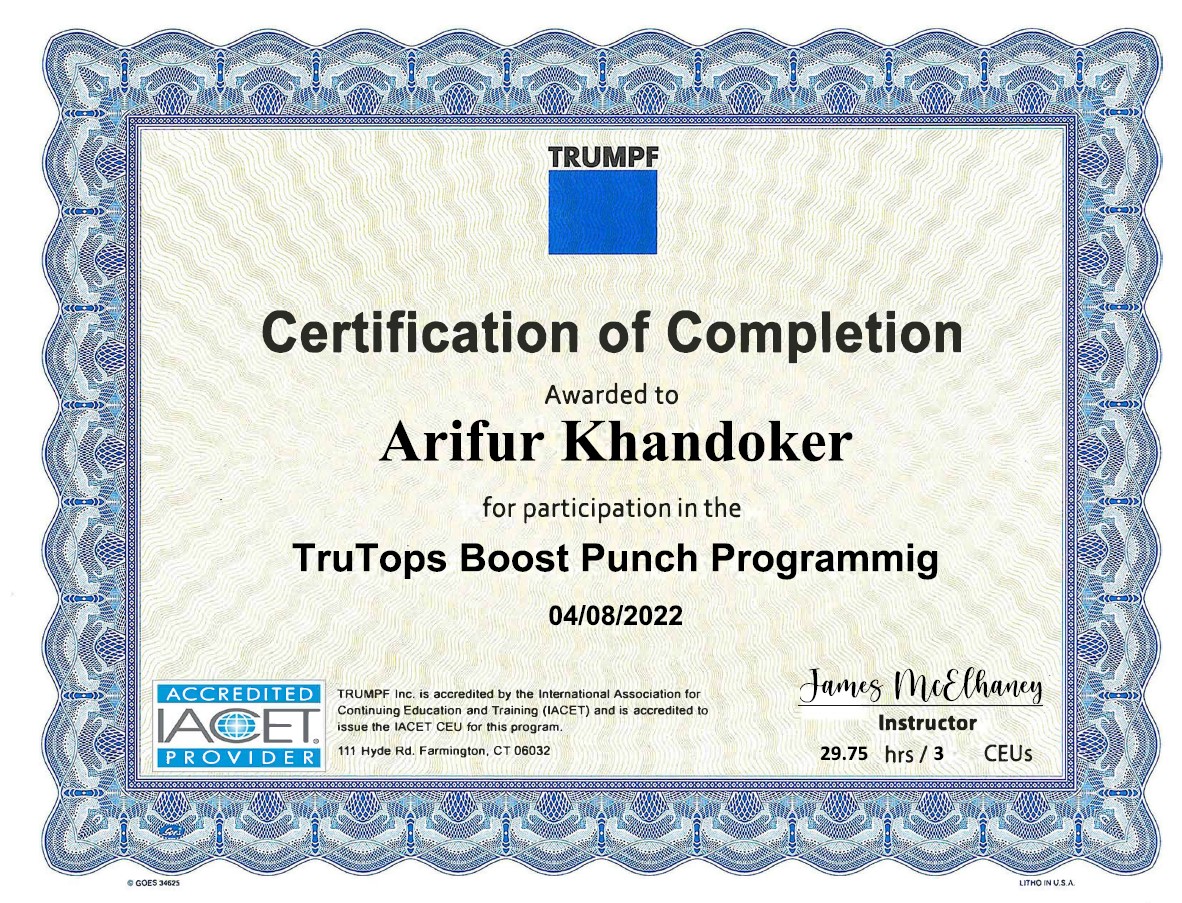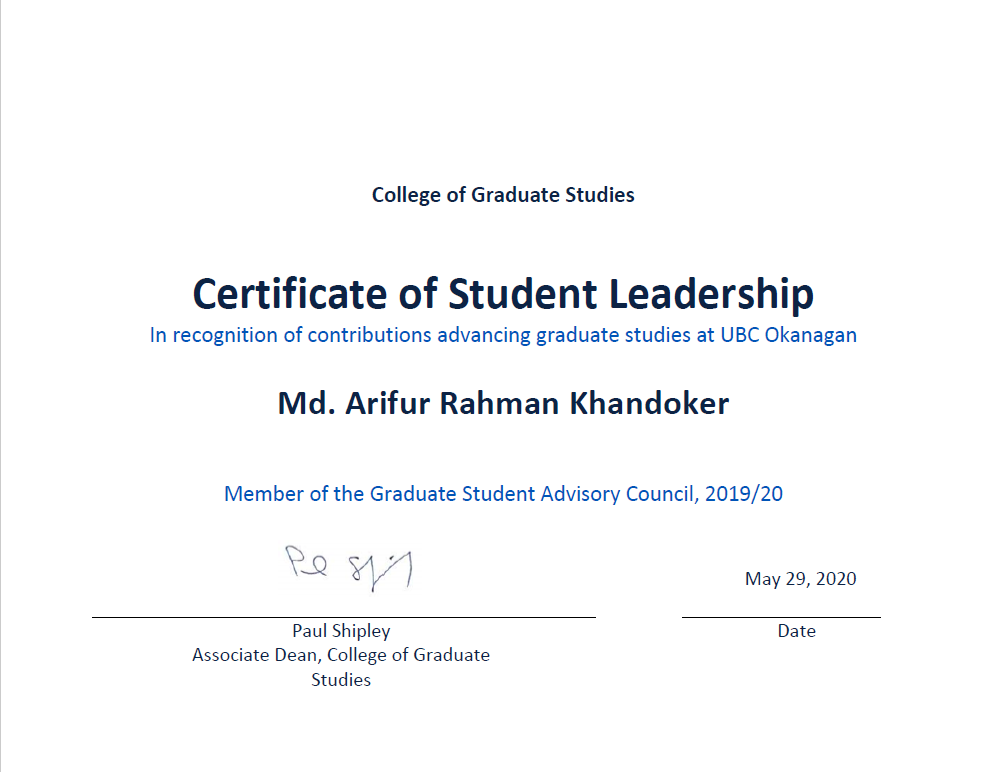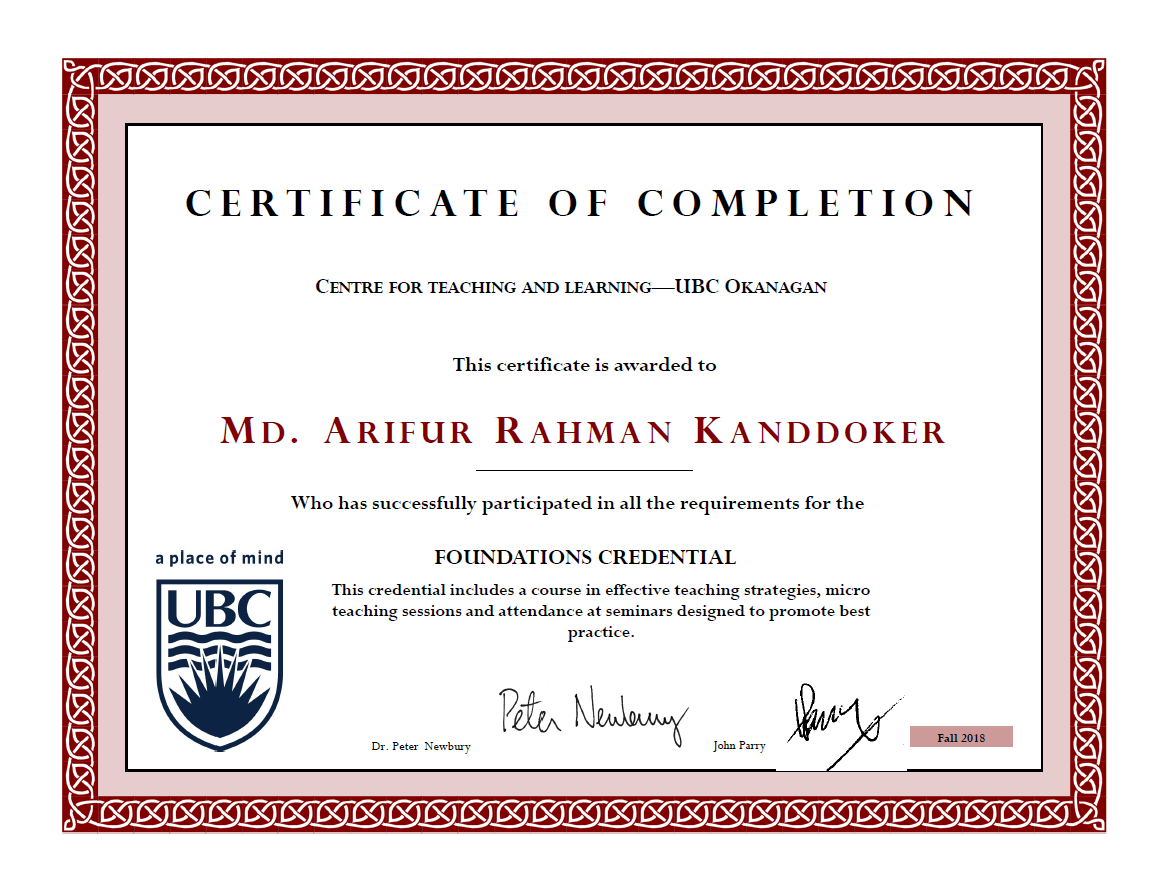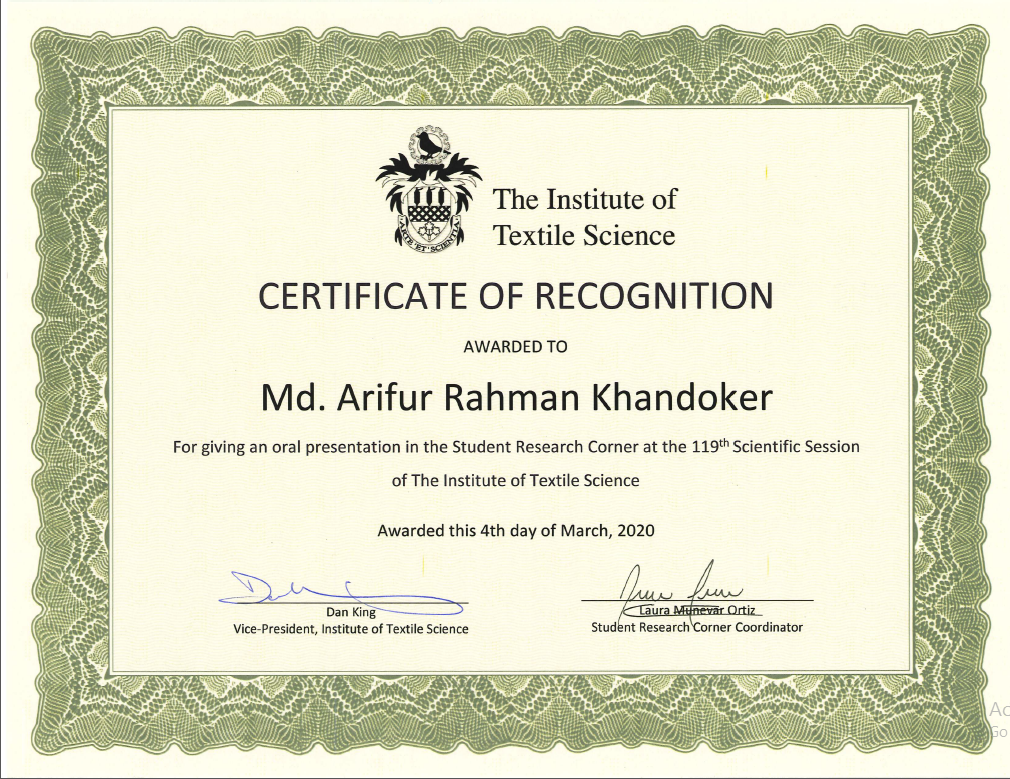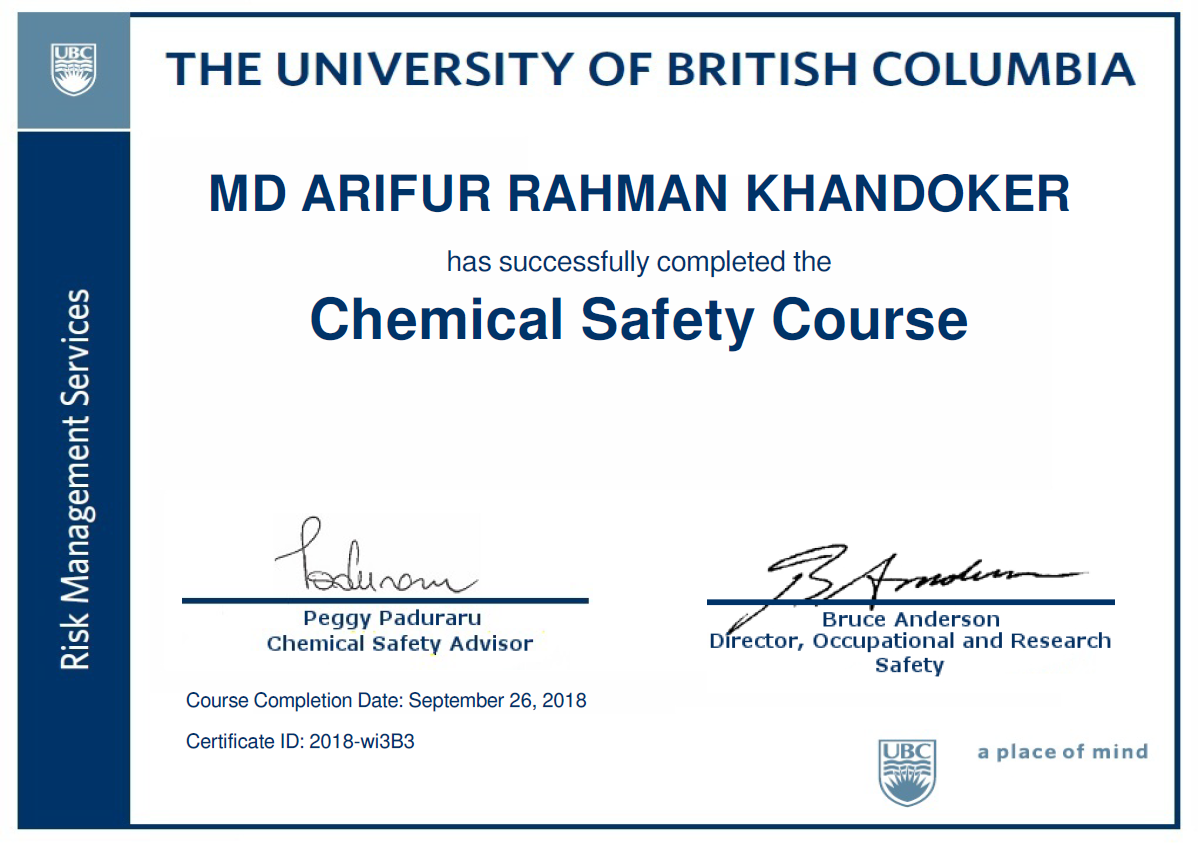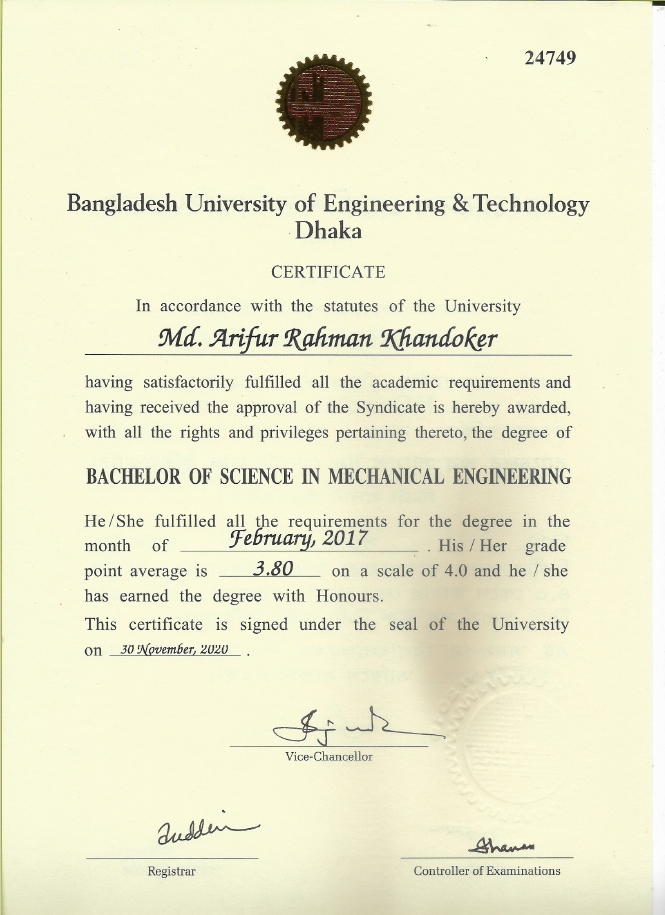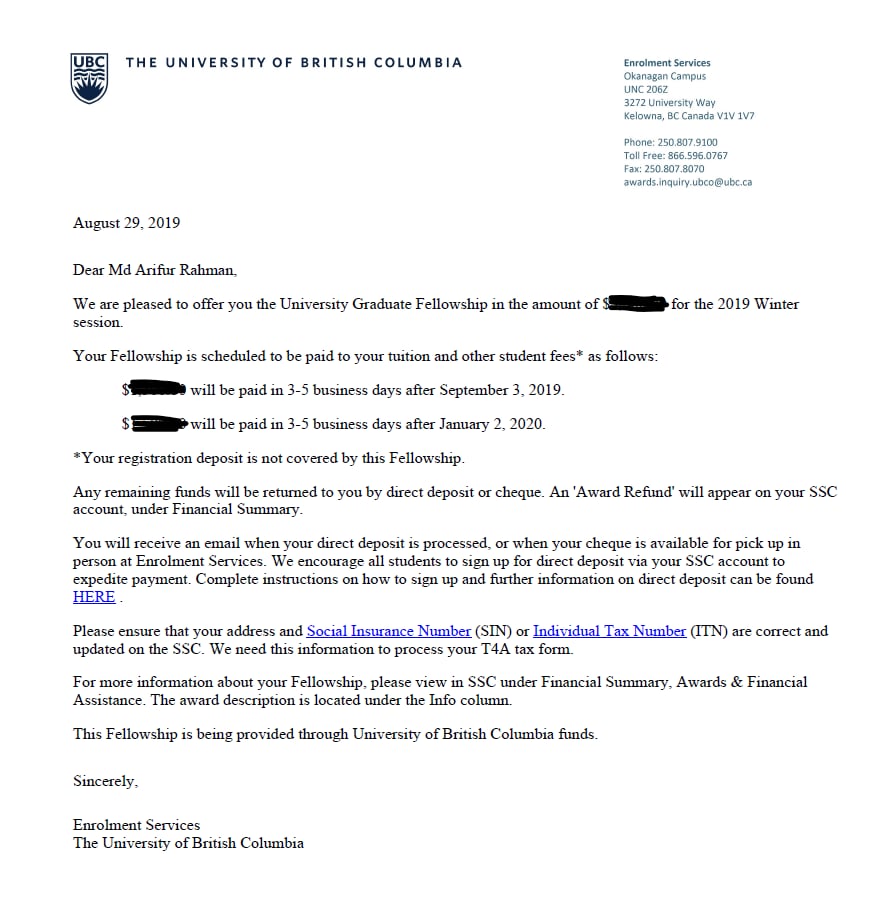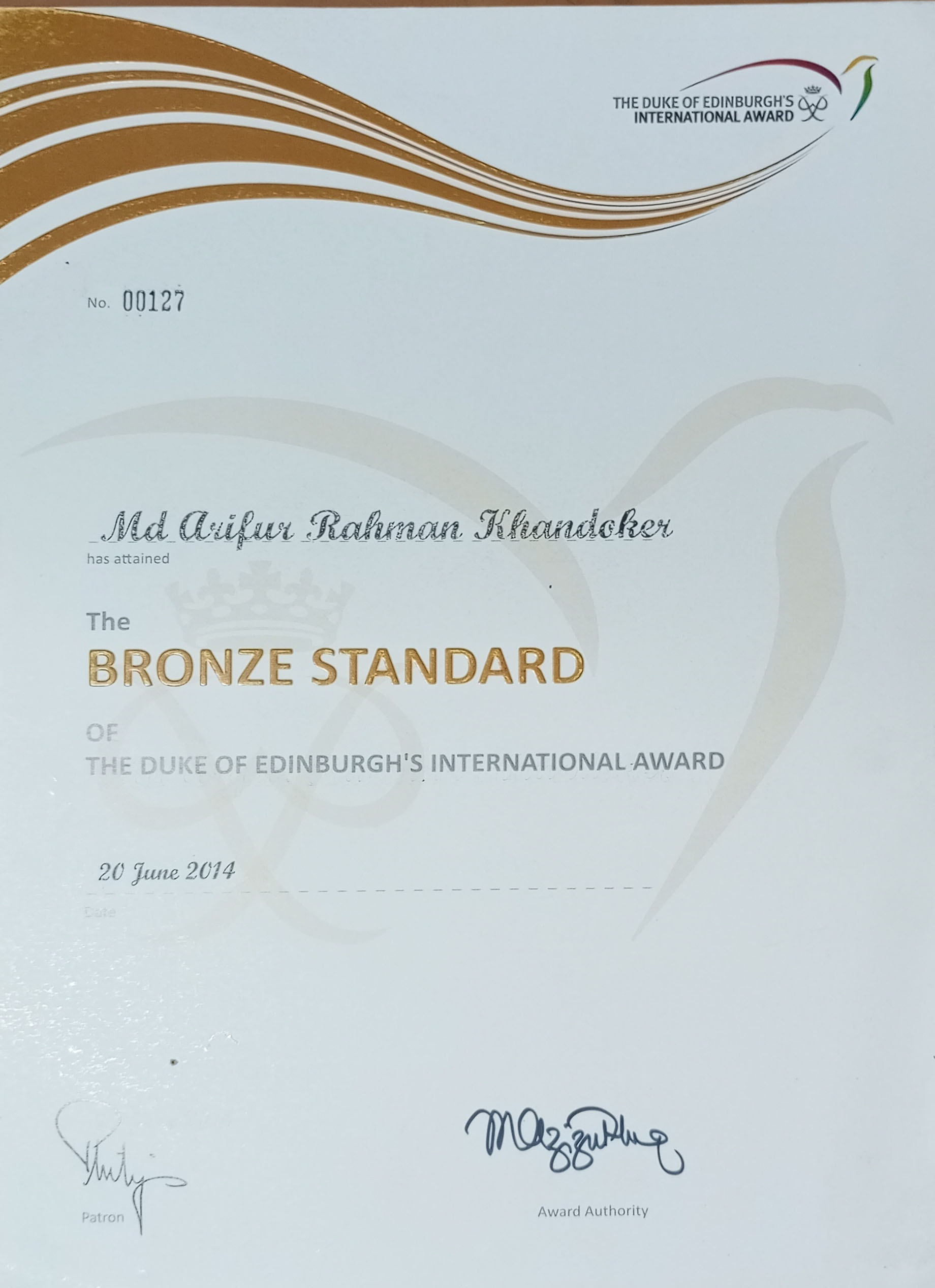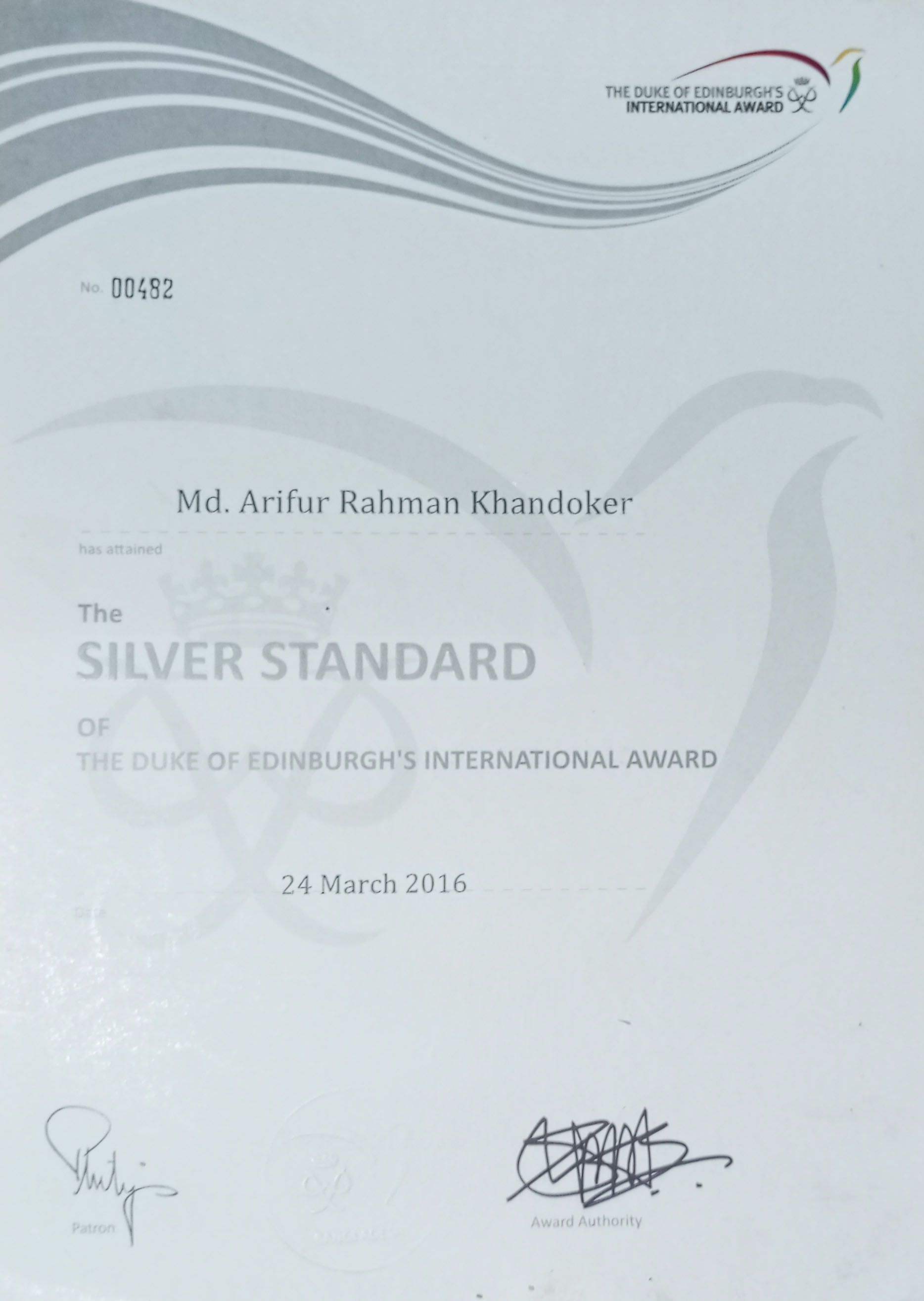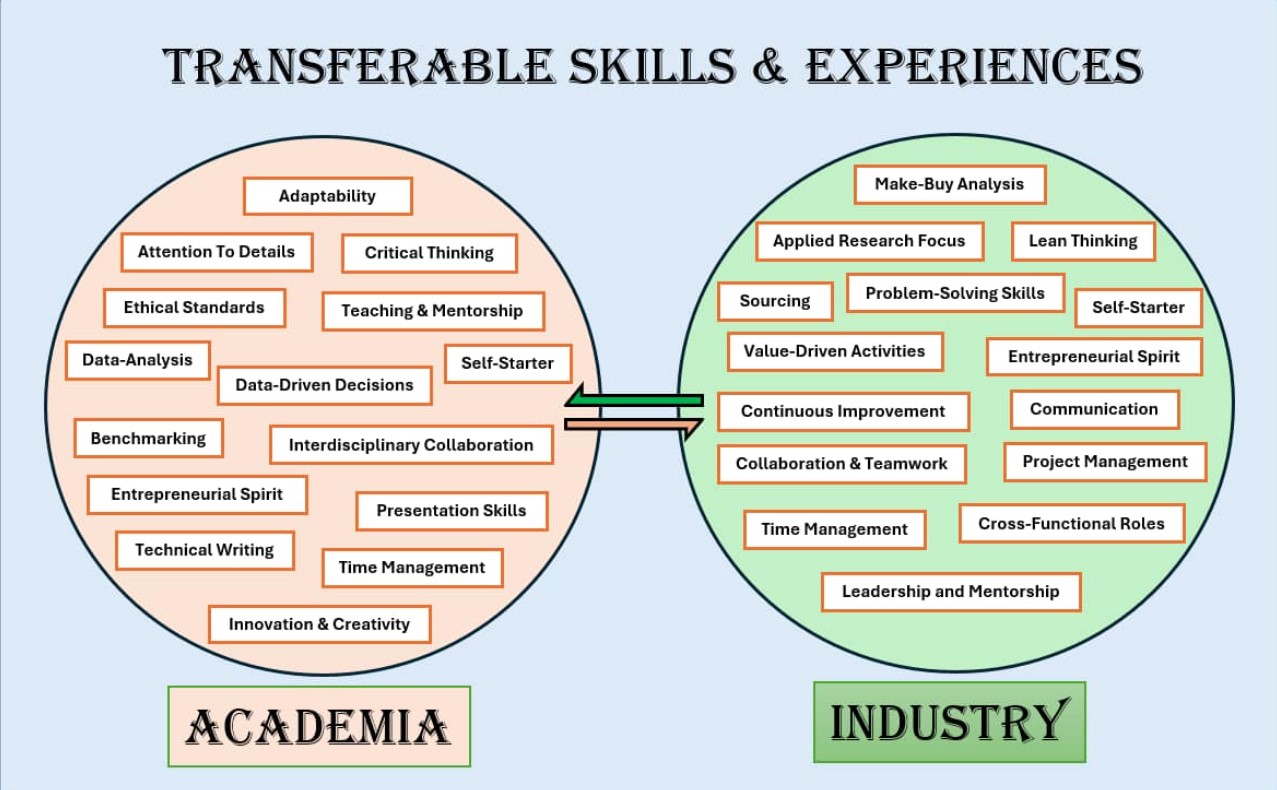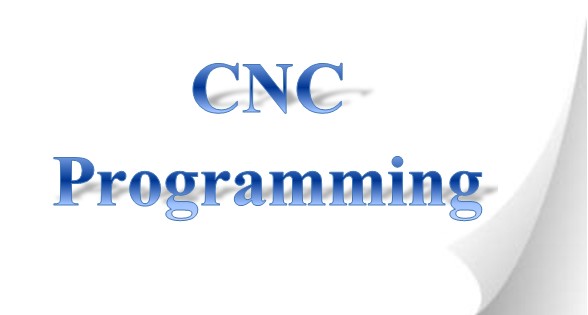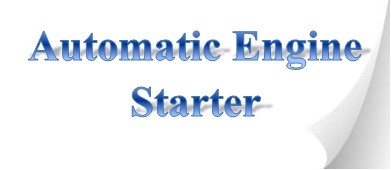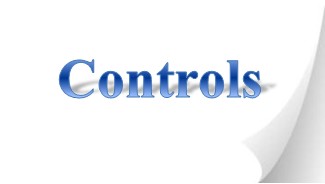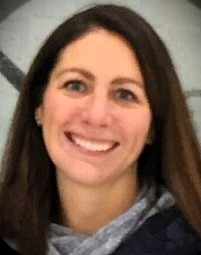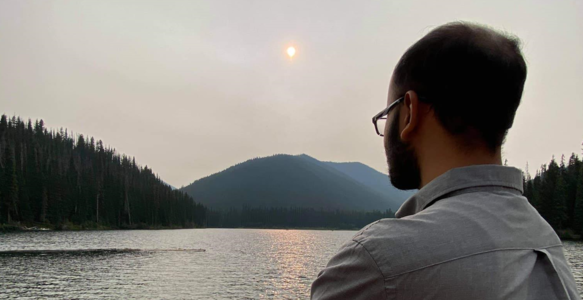
Md Arifur Rahman Khandoker
I'm
About
Hello! I am Arif, an engineer and researcher with 7+ years of research and engineering experiences. I bring 4+ years of experimental and computational research experiences in material science and fluid dynamics. I have 3+ industrial experiences of working as a manufacturing engineer where my expertise spans over lean manufacturing and continuous improvement, CAD design and 3D printing, Automation and CNC programming.
I completed my M.A.Sc. and B.A.Sc. in Mechanical Engineering from the University of British Columbia (2018-2020), Canada, and Bangladesh University of Engineering and Technology (BUET), respectively. After completing my Master’s, I began my industry career at Paramount Components Ltd. as a Mechanical Engineer/Programmer, where I gained valuable experience in sheet metal fabrication. Over the course of 2.5+ years, I developed expertise in industrial automation, CNC programming, process optimization, mechanical design, and the application of Six Sigma principles. I then diversified my industry experience with a short-term role as a Manufacturing Specialist at METHOD Innovation Partners Inc. in the construction sector. Subsequently, I joined BE Power Equipment's R&D department as a Manufacturing Engineer, where I successfully led several R&D and product development projects, applying lean manufacturing principles and integrating automation and control systems.

Researcher, Engineer & Developer.
- Background: Mechanical/Materials/Manufacturing
- Alma Maters: UBC (MASc), BUET (BSc)
- Phone: +1 (250) 899-0781
- City: Abbotsford, BC V2T 2K8, Canada
- Website: www.arifkh.com
- Degree: MASc in Mechanical Engineering
- Email: arifur.khandoker@gmail.com
Academic Projects involving Experimentation, Computational Research and Mathematical Analysis
Publications in Q1 Journals including Langmuir, ACS AMI, AIP
Thesis Publications in Statistical Analysis, Material Science, CFD
Years of Academic Research As an Undergrad Researcher and Graduate Research Assistant
Years Industry Experiences in Design & Manufacturing in Heavy metal, Sheet Metal and Construction Industries
A Glimpse into My Personality!!
While I identify as a passionate science enthusiast and tech-savvy individual, my interests extend across various fields. Take a look at how I rate some of them on a scale of 0-100%!!
Portfolio
Welcome to my portfolio! With over 3.5 years of industrial experience in sheet metal, construction, and power equipment, alongside 4 years of academic research, I have developed a well-rounded skill set in engineering. My research spans simulation, experimental, and theoretical analysis, allowing me to tackle complex challenges from multiple perspectives. Through this portfolio, I aim to showcase my diverse technical skills, innovative projects, and certifications, reflecting my commitment to continuous growth and excellence in both industry and research.
- All
- Skills & Experiences
- Academic Projects
- Industrial Projects
- Certificates
Publications
Google Scholar | ResearchGate
- Khandoker, M.A.R. ; Golovin, K. Statistical Heuristic Wettability Analysis of Randomly Textured Surfaces. Langmuir 2020 , 36, 47, 14361–1437.
- Zhao, X.; Khandoker, M.A.R.; Golovin, K. Non-fluorinated Omniphobic Paper with Ultralow Contact Angle Hysteresis. ACS Appl. Mater. Interfaces 2020 , 12, 15748-15756.
- Kozak, R.; Wiltshire, B.; Khandoker, M.A.R. ; Golovin, K.; Zarifi, M.H. Modified Microwave Sensor with Patterned Ground Heater for Detection and Prevention of Ice Accumulation. ACS Appl. Mater. Interfaces 2020 . https://doi.org/10.1021/acsami.0c17173 .
- Khandoker, M. A. R. ; Mow, R. J.; Muntaha, M. A.; Rahman, M. A. Numerical Simulation of Fire in a Multistoried Ready-Made Garments Factory using PyroSim. AIP Conference Proceedings 2018 , 1980, 050026.
- Khandoker, M. A. R. ; Galib, M.; Islam, A.; Rahman, M. A. Modelling of Fire and Fire Induced Smoke Propagation in Multizone Generic Building Structures. AIP Conference Proceedings 2017 , 1851, 020074.
- Haque, F. M.; Khandoker, M.A. R.; Wasi, M.R.; Khan, M. S. A.; Rahman, M. A. Computer Modelling of Fire Safety Performance of a Readymade Garments (RMG) Building in Bangladesh. Proceedings, Safety in the Garment Industry, Five Years after Rana Plaza April 30, 2018 .
Talks
- “Statistical Wettability Analysis of Randomly Textured Surfaces”, Wetting Dynamics, Bonn, Germany, September, 2020 (Poster presentation)
- “Solution- Free Preparation Method of Hydrophobic Nano-PDMS Coating for Fabrics”, 119th Scientific Session, Institute of Textile Science, March, 2020 (Oral presentation).
- “Numerical Simulation of Fire in a Multistoried Ready-Made Garments Factory using PyroSim”, 7th International Conference on Mechanical Engineering Conference, 2017(Oral presentation).
- “Modelling of Fire and Fire Induced Smoke Propagation In Multizone Generic Building Structures”, AIP Proceedings of the 7th Bangladesh Society of Mechanical Engineering Conference on Thermal Engineering, 2016 (Oral presentation).
Leaderships
Council Member, Graduate Student Advisory Council (GSAC), UBC Okanagan (2019-2020)
- Represented the masters students of engineering to convey their concerns in the GSAC meetings to the dean and director of the College of Graduate Studies.
- Led more than 300 engineering graduate students.
- Impacted research prospect within and outside the campus by organizing the first UBC Okanagan Engineering Conference.
- Inspired team building and networking among the grad students by organizing a camping event for 33 graduate students at Valemont (BC), Banff and Jasper (Alberta).
- Engaged with industries like KalTire, Fortis BC etc to manage sponsorships worth $20k for the conference event ensuring maximum brand exposure to the audiences.
- Led the executive team to organize monthly events for 100+ bangladeshi students to provide opportunities for networking within the community.
Mentorship
Academic Mentorship:
Arif was my TA at UBC and my mentor at the Okanagan Polymer Engineering and Research Applications (OPERA) Lab at UBC Okanagan. My first interaction with Arif began in 2018 when he served as the TA for an undergraduate differential calculus course, where he took the time to build a personal connection with me. He greatly appreciated my attentiveness, strong grades, and keen interest in academic research. His encouragement ultimately inspired me to join his lab as an undergraduate researcher during my second year.
During this period, Arif showed me how to develop the necessary lab skills to thrive in a research setting and mentored me through various challenges. His mindset for personal development and his passion for academic research were contagious, making him an inspiring and enjoyable mentor, as well as a pivotal figure in my growth. In addition, Arif’s passion for teaching was equally evident. As a TA, he actively reached out to me for feedback and showed genuine appreciation for constructive criticism, even beyond his official duties, demonstrating his unwavering commitment to improving his teaching skills. His dedication to teaching and passion for helping others grow make him an exceptional mentor, and his commitment to continuous improvement has had a lasting positive impact on my professional journey. I wish him all the best.
Tutorials
Python Tutorials
- Learn How to Import Excel Data in Spyder IDE Python Tutorial | Importing CSV Files in Spyder | Quick and Easy Method
- Learn About Python Syntax, Indentations and Comments Python Syntax | Indentations | Comments
- Learn How to Plot Data Imported From Excel Python Tutorial | Plotting Imported Data in Python (Spyder IDE) From Excel | Quick and Easy Method
- Learn to Code for Linear Regression Modeling Through Gradient Descent Algorithm Python Coding (Spyder IDE) for Linear Regression Modeling (without using Scikit-learn)
- How to Plot Horizontal and Vertical Lines Using Python Plotting Horizontal and Vertical Lines in Python
Machine Learning/Statistics Tutorials
- Understand R-Squared in Regression! R-Squared (Coefficient of Determination) - Physical Meaning and Mathematical Interpretations
- Learn The Basics of Linear Regression Modeling and Application of Gradient Descent Algorithm Linear Regression Model, Part 1: Theoretical Glimpse | Machine Learning
- Learn to Code for Linear Regression Modeling Through Gradient Descent Algorithm Linear Regression Model, Part 2: Python Coding (Spyder IDE) without using Scikit-learn
Microsoft Excel Tutorials
- Make your database lean using dropdown list and formulas! Dynamic/Adjustable Table in Excel - Part1: Dropdown List of Items with Associated Data
- Use Microsoft Visual Basic For Creating a Dynamic Table Dynamic/Adjustable Table in Excel - Part 2: Microsoft VBA for Adjustable Borders and Title
Lean Manufacturing
- Introduce Yourself to Product and Process Design in Lean Manufacturing! DFMEA/PFMEA Part-1: Product Design and Process Design
- Learn why DFMEA is key in Lean Manufacturing and Product Development DFMEA/PFMEA Part-2: Why DFMEA is required in Product Design??
Industrial (R&D) Problem-Solving
- Explore How to Approach an R&D Project! Industrial R&D Problem Solving, Part-1: Introduction and Setting Up Background
- Checkout the Value Stream Mapping of an R&D Problem-Solving Process! Industrial R&D Problem Solving, Part 2: Defining Problem Solvng Process
- Explore Different Approaches to R&D Problems Based on Innovation Requirements. Industrial R&D Problem Solving, Part-3: Assessing Level of Innovation in the Project
- Explore Ways to Generate Solution Ideas for an R&D Problem! Industrial R&D Problem Solving, Part 4: Generating Ideas
Entrepreneurship
- Explore product design and process through an entrepreneurial lens! DFMEA/PFMEA Part-1: Product Design and Process Design
Testimonials
Working alongside exceptional individuals has been an enriching experience, one that continually inspires and motivates me. Each collaboration contributes to my ongoing passion for learning and engaging with diverse talents!
Networks
- All
- Supervisors
- Collaborators
Undergrad Supervisor
(2016-2018)
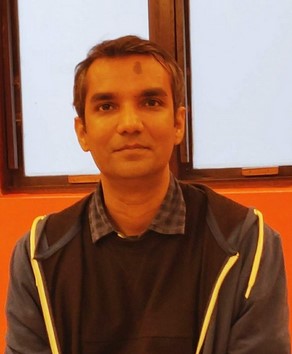
Md. Ashiqur Rahman, PhD
Professor, Department of Mechanical Engineering,
Bangladesh University of Engineering and Technology (BUET),
Dhaka, Bangladesh.
Masters Supervisor
(2018-2020)

Kevin Golovin, PhD, PEng
Assistant Professor, Department of Mechanical & Industrial Engineering,
University of Toronto,
Toronto, ON
Phone: 417.978.0707
Engineering Supervisor
(2021-2022)
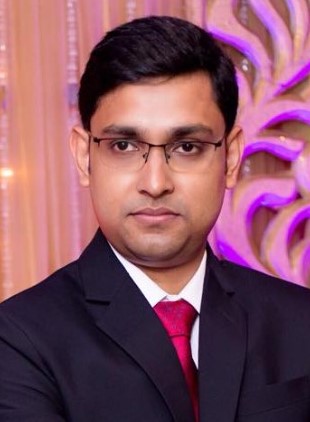
Hasib Rahman, EIT
Engineering Analyst, Toyota Motor Manufacturing Canada,
Cambridge, Ontario, Canada.
Reporting Manager
(2022-2023)

Justin Pryor
Operations and Business development, Paramount Components Ltd,
Abbotsford, BC, Canada.
Collaborators
| Name | Collaboration Timeline | Relation | Current Position |
|---|---|---|---|
| Musanna Galib | 2016-2017 | Undergrad Thesis Partner | PhD Student at UBC |
| Adnan Islam | 2016-2017 | Undergrad Thesis Partner | System Integration & Test Engineer at ASML |
| Md Ali Muntaha, Ph.D. | 2017-2018 | Co-Author | Post Doc. at Purdue University |
| Rownak Jahan, Ph.D. | 2017-2018 | Co-Author | PhD from University of Delaware |
| Fariha Haque | 2017-2018 | Co-Author | PhD Student at Ohio State University |
| Murtaza Wasi, Ph.D. | 2017-2018 | Co-Author | Post Doc at Cornell University |
| Rahat Mahmud Khan | 2017-2018 | Co-Author | MS Student at UIUC |
| Shaikh Al Mahmud Bhuiyan | 2017-2018 | Co-Author | PhD Student at University of Kentucky |
| Xiaxiao Zhao, Ph.D | 2019-2020 | Co-Author | Assistant Professor at University of Maine |
| Mohammad H Zarifi, Ph.D. | 2019-2020 | Co-Author | Associate Professor at UBC |
| Ryan Kozak | 2019-2020 | Co-Author | Microwave Engineer at Ansys |
| Benjamin D Wiltshire | 2019-2020 | Co-Author | PhD from at UBC |
| Afzal Neelav | 2020-2021 | Teammate @PCL | Manufacturing Engineer at Seaspan ULC |
| Shailen Saha | 2020-2023 | Teammate @PCL | Manufacturing Planner |
| Gizem Ozsu | 2021-2023 | Teammate @PCL | Project Engineer at Westmill Industries |
| Sadhak Gautam | 2022-2023 | Teammate @PCL | Project Engineer at Paramount Components Ltd. |
| Shayak Ibna Faruqui | 2022-2023 | Teammate @PCL | Project Engineer at Paramount Components Ltd. |
| Rayan Danyal | 2023 | Teammate @PCL | Project Engineer at WeatherSolve Structures |
| Fidelis Eberegbe | 2023-2024 | Teammate @METHOD | Design Engineer at METHOD |
| Ryan Gates | 2024 | Teammate @ BE | Manufacturing Engineer (R&D) at BE |
| Darrell Nicholas | 2024 | Teammate @ BE | R&D Engineering Specialist at BE |
| Matt Golke | 2024 | Teammate @ BE | Quality Engineer at BE |
| Anwit Adhikari | 2024 | Teammate @ BE | Design Engineer at BE |
| Stefano Salati | 2024 | Teammate @ BE | Quality Specialist at BE |
Contact
Address
32275 George Furguson Way, Abbotsford, BC V2T 2K8, Canada.
Call Me
+1 (250) 899-0781
# md.khandoker@alumni.ubc.ca,
# markshourav@gmail.com


